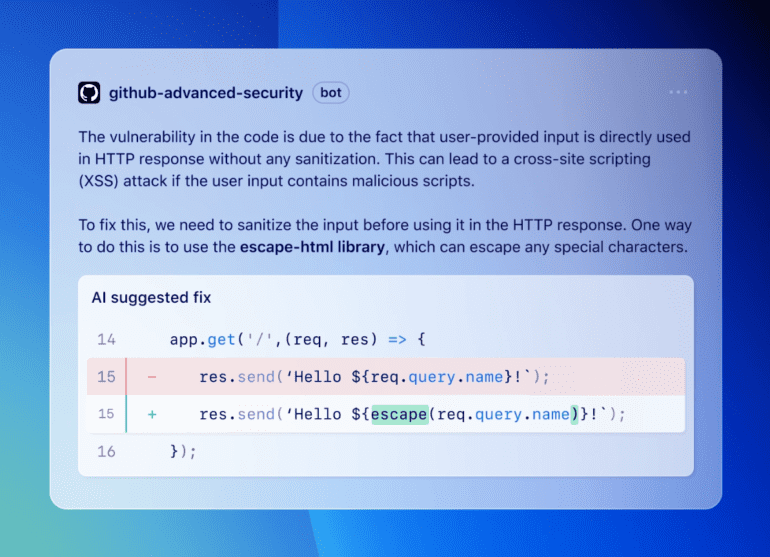- GitHub unveils code-scanning autofix feature for proactive vulnerability detection and remediation.
- Combines Copilot and CodeQL technologies to automatically fix over two-thirds of vulnerabilities.
- Coverage spans 90% of alert types across supported languages.
- Exclusive to GitHub Advanced Security (GHAS) customers.
- Automates remediation, freeing development teams to focus on strategic initiatives.
- Utilizes CodeQL engine, heuristics, and Copilot APIs for seamless fix suggestions.
- Employs OpenAI’s GPT-4 model for accurate fix recommendations.
- Despite occasional misinterpretations, it transforms the code security landscape.
Main AI News:
Amidst a wave of advancements in AI-powered debugging tools, GitHub’s latest offering stands out as a beacon of hope for developers battling code vulnerabilities. Building upon the foundation laid by its renowned Copilot, GitHub introduces a groundbreaking code-scanning autofix feature designed to proactively identify and remedy security flaws during the coding process itself.
This cutting-edge solution, a fusion of GitHub’s Copilot and CodeQL technologies, promises to mitigate over two-thirds of detected vulnerabilities, often without requiring manual code intervention. Leveraging real-time analysis capabilities and semantic code analysis, GitHub’s autofix feature boasts coverage of more than 90% of alert types across supported languages, including JavaScript, Typescript, Java, and Python.
Available exclusively to GitHub Advanced Security (GHAS) customers, this innovative tool marks a significant milestone in the ongoing battle against cyber threats. “Just as GitHub Copilot streamlines development tasks, code scanning autofix empowers development teams to reclaim precious time otherwise spent on remediation,” states GitHub in its official announcement. By automating vulnerability remediation, teams can refocus efforts on strategic initiatives, bolstering business protection amidst an era of accelerated development.
At its core, this groundbreaking feature harnesses the power of GitHub’s CodeQL engine, enabling preemptive vulnerability detection prior to code execution. Originally incubated within Semmle and later integrated into GitHub’s ecosystem, CodeQL has undergone iterative enhancements since its public release in 2019. GitHub’s commitment to innovation extends beyond CodeQL, incorporating a blend of heuristics and Copilot APIs to suggest fixes seamlessly.
Fueling GitHub’s autofix recommendations is OpenAI’s GPT-4 model, renowned for its language processing capabilities. While GitHub expresses confidence in the accuracy of its suggestions, acknowledging that a small percentage may misinterpret code nuances, the overall impact on code security is undeniably transformative. As development teams embrace this AI-driven paradigm shift, GitHub’s autofix feature emerges as a cornerstone in fortifying code resilience against evolving cyber threats.
Conclusion:
GitHub’s introduction of the code-scanning autofix feature marks a significant advancement in code security solutions. By seamlessly integrating AI technologies, GitHub empowers development teams to address vulnerabilities during the coding process proactively. This innovation underscores a growing trend towards AI-driven automation in cybersecurity, signaling a transformative shift in the market towards preemptive threat mitigation and code resilience. Companies seeking to stay ahead in the competitive landscape must embrace such advancements to safeguard their digital assets effectively.

